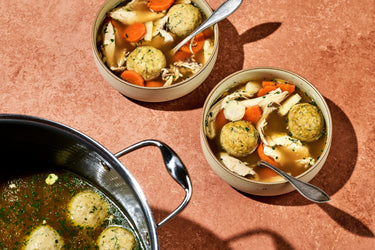8 Soup Tips That Will Make Everyone Demand the Recipe

Some look forward to the first chill in the air for pumpkin-spice everything, or sweater weather. But soup enthusiasts know what time it really is: Get in, loser, we’re getting out the big pot.
Is there a more chameleonic food than soup? It can be a mug of broth when you’re exhausted, or a deluxe bouillabaisse at a dinner party. It’s invited to the Super Bowl as chili with fun toppings; it’s a bowl of chicken soup after a long day; it’s an elegant white bean number with a swirl of herb oil. You could travel the world and eat nothing but soup: German lentil, Ghanaian peanut, Spanish gazpacho, Wisconsin cheese.
Market research suggests that as our collective stress intensifies (have you seen the news lately?) fully one-third of global consumers are finding comfort in soup.
So soup is a good friend, but it also deserves to be taken seriously: What brings soup from good to great? Here are eight tricks to make your soup so astonishingly delicious your friends will wonder how you did it.
1. Choose the Right Pot
You want a pot that has ample surface area for sautéing and browning, one that conducts heat evenly and has a lid so that you can control reduction. In other words, this is when you reach for the trusty Hybrid stockpot: You want a big batch, don’t you?

2. Dress Your Soup in Layers
Season with salt in the beginning, middle and end. If you’re using salted broth, go easy, but you will still want to season throughout. The same goes for spices. Some can be added when you’re sautéing aromatics. But for more intense flavor, bloom whole spices in oil and swirl them in just before serving.
3. Choose (or Make) a Good Broth
If you are a soup person, make it your mission to figure out which supermarket broth actually tastes good to you. This knowledge is the holy grail of soup-making. (We tend to like bouillon pastes.) Take this big-batch chicken noodle soup–it’s guaranteed to be delicious when you start with good broth.

4. Bases Shouldn’t Be Basic
Most soups start with a sauté of aromatics like onions or shallots, garlic and ginger, peppers and celery. This step builds complex flavor. The most dramatic example: slowly caramelizing onions for French onion soup. The same goes for searing protein. If the recipe directs to brown meat or chicken before adding liquid, let those ingredients cook undisturbed until they release without sticking.
5. Fat Is Your Friend
The best soups include a judicious amount of flavorful fat. Think of a drizzle of olive oil over lentil soup before serving, or this tofu soup that starts with just a little bit of pork belly, to round out the punchy flavor of the kimchi. Or generously dollop crème fraîche on a butternut squash soup.
6. Texture Rules
There’s always a place for an utterly simple bowl of broth, but in general, the best soups don’t just lie there: They have varied textures that make them exciting to eat. Take this Taiwanese beef noodle soup, which features super-tender beef and springy noodles, plus barely cooked bok choy for fresh crunch. The key here can be as simple as a shake of store-bought fried shallots or a lashing of sour cream.

7. Make Toppings Feel Deluxe
Toppings are the easiest way to make any soup special. Case in point: this pho. The same goes for chili and pozole. Potato soup? Top it with shredded sharp cheddar, scallions and hot sauce and now you have something that tastes like the best loaded potato, like, ever.
8. Punch It Up Before Serving
Save delicate herbs for the end and add them right before serving–they’ll have an aromatic immediacy they wouldn’t if they were cooked longer. (Case in point: this big-batch matzo ball soup that gets a last-minute zingy dose of dill and parsley.) The same goes for a squeeze of lemon or lime, or a dash of balsamic.
Soup: It's there for you.





